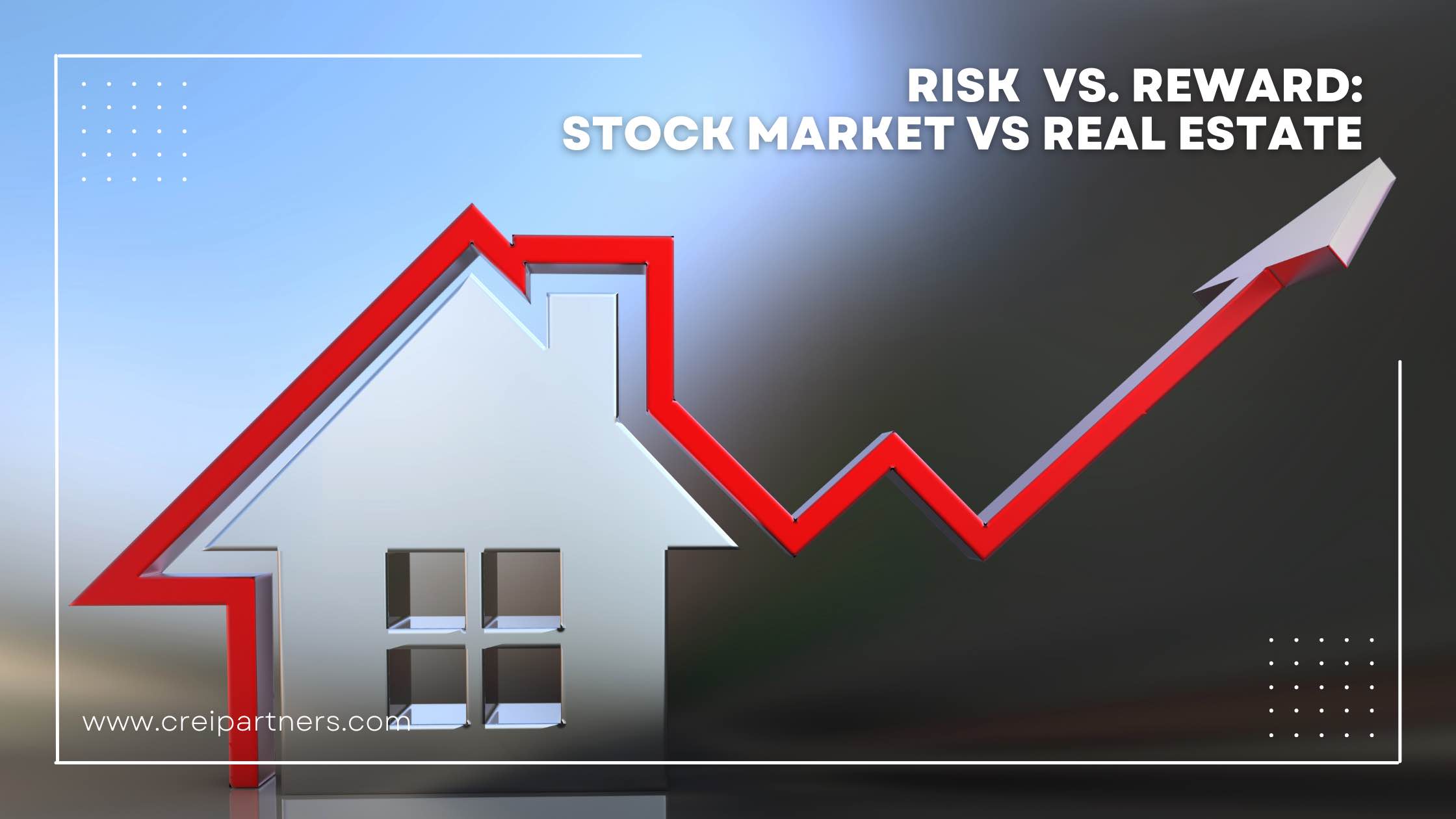Wealth building is a universal goal. However, as we all know, there are a myriad of ways, filled with both risks and rewards, to attempt to reach this goal. The primary decision point of many investors hinges on the decision between stock market and real estate investing. Which offers a more secure, predictable path toward hitting financial goals?
First, let’s get on the same page by defining investment risk. The Financial Industry Regulatory Authority or Finra.org defines risk as “any uncertainty with respect to your investments that has the potential to negatively affect your financial welfare.” They go on to state that every investment has risk, and that the level of reward often has a correlation to the level of risk in an investment. Riskier investments may have higher rewards-if there are rewards at all.
Below you will find a discussion of 4 stock market risks, that turn into rewards in real estate investing.
Risk #1: Speed of Market Shifts
The stock market, by definition, is volatile.
With modern technology, we have reached a stage where stock market transactions can be initiated at the speed of thought. And, like any other product, the price of shares fluctuates with supply and demand. Prices fall when there are more sales occurring, and rise when there are more investors interested in buying. Adding in the risk of price impact due to geopolitical instability along with regularly occurring corrections and recessions-you can begin to see how stock market trends can only be relied upon to be unpredictable.
Real Estate transactions are slow, by comparison.
Because real estate is not bought and sold on an exchange, the individual or syndicate investor is somewhat insulated from price fluctuations. As a large physical asset, real estate requires more effort and time, and more legal and financial involvement to purchase-which slows down the speed of transactions. This slower rate of trade for physical assets yields less liquid assets, but far less volatile asset value changes.
Risk #2: Lack of Control Over Market Forces
Diversifying within the stock market is still risky
Common advice when investing in the stock market includes diversifying your holdings. Spread purchases among many industries in order to mitigate risk in any single industry. Unfortunately, none of us are experts in more than a handful of fields, if we can call ourselves experts at all. Adding in risk due to generalized market-wide, nationwide, or worldwide instability, and you begin to understand how there is no way to mitigate all risk with investment in the stock market.
Everyone needs a place to live, giving less risk to real estate investing
Real estate is a necessity for everyone-housing is a commodity, and most of us need places to work, as well. It will always be relevant. Pricing may tick up or down slowly over time, but there are fewer surprise shocks to the market as housing is indispensable. Even during unfortunate times when foreclosure rates increase, rental rates also increase as these families still need a home.
Risk #3: Competition
New competition can destroy valuation in the stock market
Stockholders may or may not be aware of competition on the horizon that destroys the values of specific stocks. New tech, new companies, and new challenges can send the value of individual stocks or entire industries plummeting. Even if forewarned, the scale of impact from new players in the game can rarely be forecasted.
In real estate, competition helps everyone
With real estate investing in multi-family housing units, it may take years for the new apartment building in town to come to fruition. This allows plenty of time to adjust the syndicate’s approach to upgrades and marketing to remain competitive. Furthermore, these new complexes are often Class A properties. Competition helps everyone, in this case, as it provides a new ceiling for upgrades and rent increases for value add Class B or C properties. Generally, the occupancy rate in value add Class B or C properties is usually high, regardless of new builds.
Risk #4: Lack of Control Over Market Forces
With the stock market, you’re just a passenger
Rarely will a single investor or investment firm have enough clout to impact stock prices and portfolio valuation. With so many risk factors for corrections or recessions in the stock market, it can be easy to feel like you’re just the passenger on the train without any ability to steer the engine.
With syndicate real estate investing, you have a direct line to the conductor
Real estate syndicate investing is about building a relationship with the sponsor along with a foundation of trust and communication. The sponsor will allow you to ask questions, provide feedback, and stay informed throughout the entire lifecycle of the deal. Quarterly meetings and updates provide scheduled opportunities for discussion. In addition, the sponsor is available and reachable throughout the process, and ongoing transparency is key.
Conclusion:
Investment and wealth-building are personal journeys, with no one-size-fits-all approach suitable for every person. Stock market and real estate investing both offer potential paths to your goal. Diversification is key, but you should never feel like the stock market is the only option for growth. The real estate syndicate investment model remains a lower-risk option, with greater control and transparency, than the stock market offers.
Additional Resources:
Diversifying from Stock Market to Multi-Family Real Estate with Sandhya Seshadri
REITs vs Multi-Family Syndications: What are the biggest differences?
Dave Seymour -The Untold Stories Of Real Estate Investing- Insights of ”Flipping Boston”


 Subscribe to our newsletter so you never miss out on new investment opportunities, podcasts, blogs, news and events.
Subscribe to our newsletter so you never miss out on new investment opportunities, podcasts, blogs, news and events.